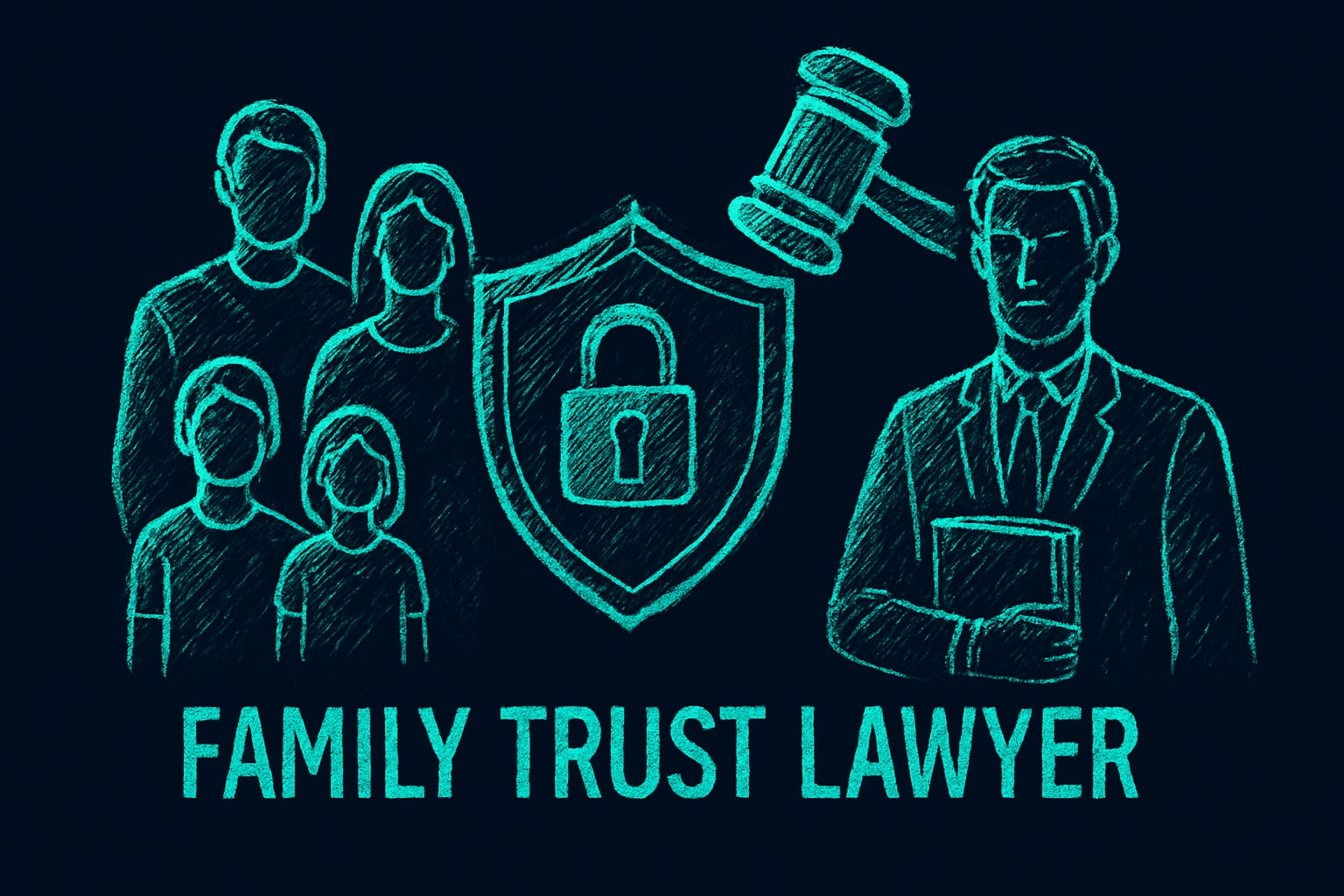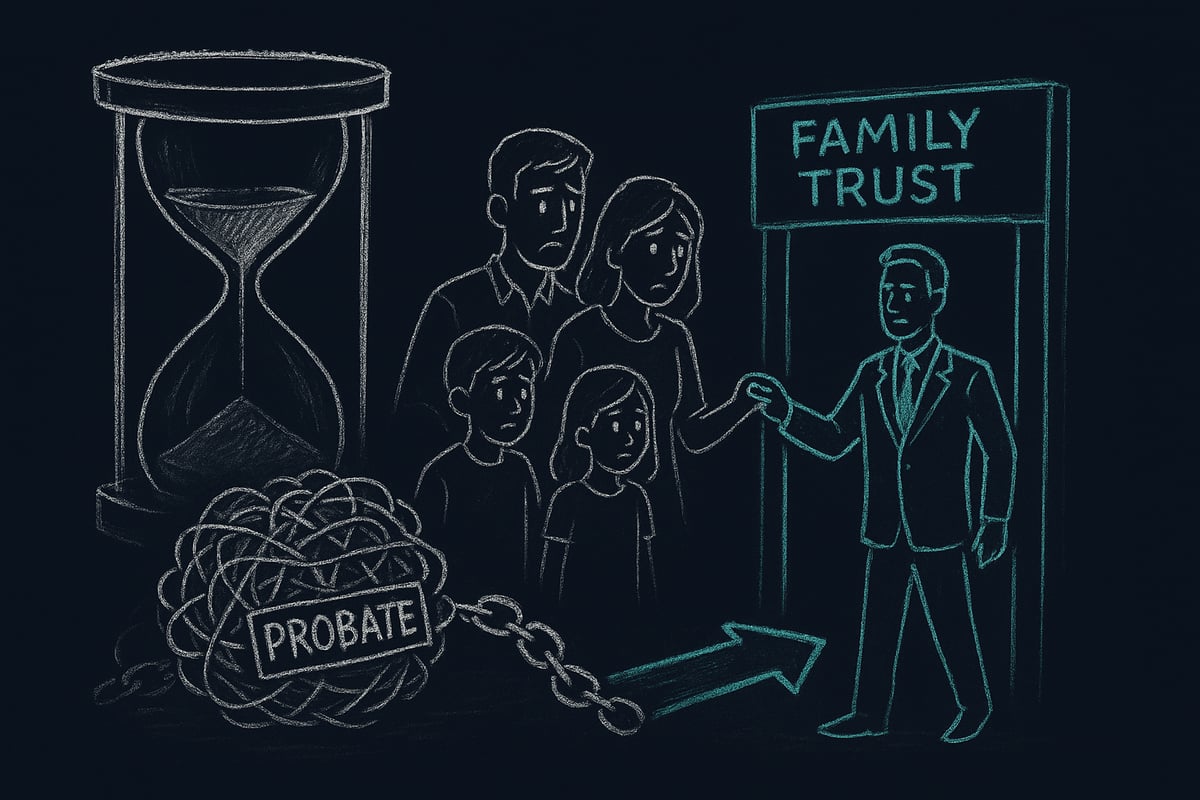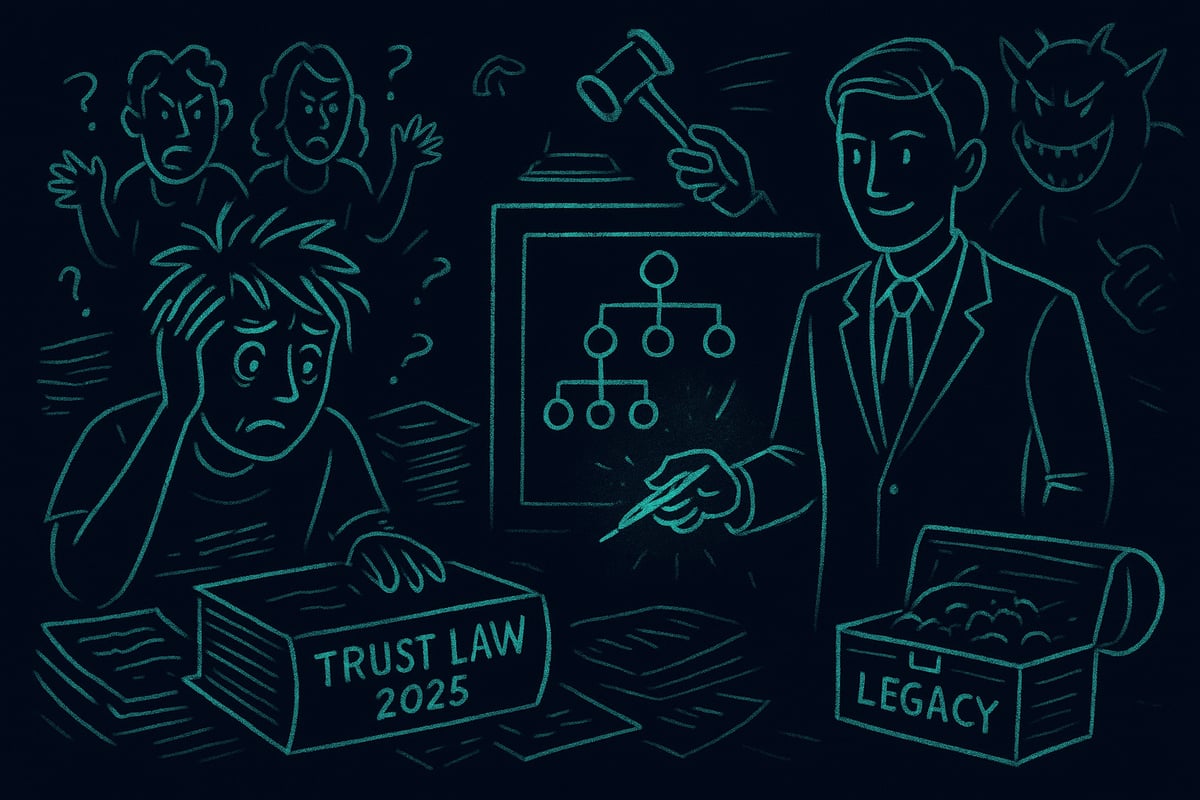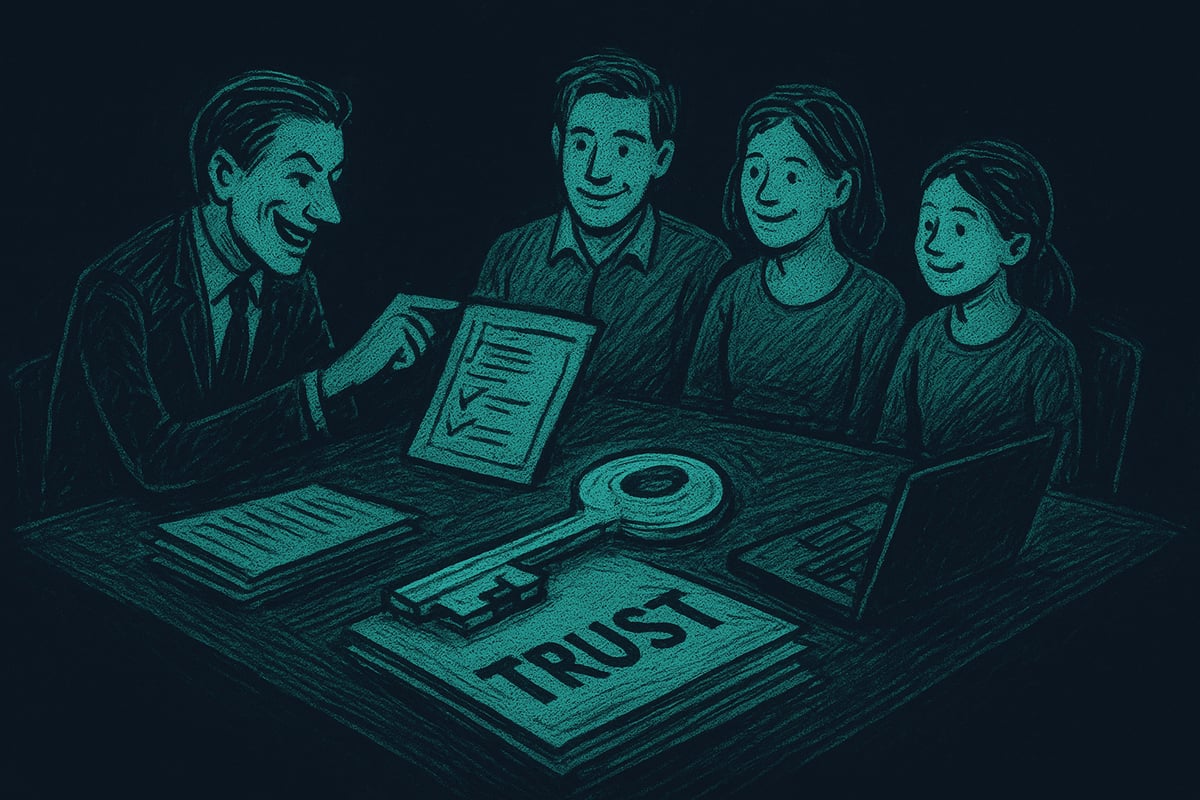Family Trust Lawyer Guide: Secure Your Legacy in 2025

Your family shouldn’t have to fight over your stuff when you die. Most people avoid estate planning until chaos erupts, but a family trust lawyer can save your loved ones from probate nightmares, greedy exes, and endless paperwork. This guide will roast your procrastination, break down what a family trust lawyer actually does, and show you how to protect your legacy in 2025. Congrats, you’re about to become slightly less irresponsible. Ready to start planning your death party? Let’s make sure your wishes—not some distant cousin’s—actually matter.
Understanding Family Trusts: What They Are and Why They Matter
You’re going to die. Sorry, but it’s true. The real question is: will your family be left with a smooth path to your legacy, or will they be left fighting over your old collection of Beanie Babies like a scene from a bad reality show? Enter the family trust lawyer, your ticket to making sure your wishes aren’t tossed out with the trash. Let’s break down what a family trust really is, why it matters, and how it can save your loved ones from probate purgatory.

Defining a Family Trust
A family trust is not some secret handshake society for the wealthy. It’s a simple legal arrangement where you (the grantor) hand over your assets to a trustee, who then manages them for your chosen beneficiaries. The family trust lawyer is the architect who makes sure your trust is built on solid legal ground.
There are two main flavors of trusts: revocable (you can change your mind, like with pizza toppings) and irrevocable (no take-backs, like that time you gave your cousin your vintage PlayStation). Here’s how they stack up:
| Trust Type | Can You Change It? | Who Controls Assets? | Probate Avoidance |
|---|---|---|---|
| Revocable | Yes | Usually You | Yes |
| Irrevocable | No | Trustee | Yes |
The main players are:
- Grantor (you, the soon-to-be-legend)
- Trustee (the manager, sometimes you, sometimes not)
- Beneficiaries (the lucky folks who get your stuff)
Picture this: with a trust, your family skips the months-long probate line and gets straight to the good stuff. Without a trust, it’s like waiting at the DMV forever, but sadder.
Benefits of Setting Up a Family Trust
Let’s get real: creditors, taxes, and lawsuits are like vultures circling your estate. A family trust lawyer helps you armor up. Trusts can shield assets from creditors, reduce estate taxes, and keep your family’s business out of the public eye. Want to avoid probate fees that can gobble up 5% of your estate? Trusts do that, too.
- Protects your assets from lawsuits and ex-spouses
- Minimizes taxes and probate costs
- Keeps your financial life private
- Makes sure your stuff goes to the right people, fast
According to the Estate Planning Statistics & Facts to Know in 2025, families with trusts are far less likely to experience costly delays or disputes. Imagine skipping months of court drama and giving your family a head start.
Common Scenarios for Using a Family Trust
Not just for folks with yachts. A family trust lawyer is clutch if:
- You have a blended family and want to avoid World War III over your assets
- You have minor kids or someone with special needs who’ll need extra care
- You own a business and don’t want your hard work going down the drain
- You own property in multiple states and want to avoid probate in every one
Let’s say you own a rental property in Florida and a ski cabin in Colorado. Without a trust, your family gets to enjoy probate in both states. With a trust, your lawyer makes it one tidy handoff. Cheers to less paperwork and more peace.
Potential Drawbacks and Limitations
Of course, there’s no free lunch. Setting up a trust means upfront costs and some ongoing admin. You might lose direct control of assets if you pick an irrevocable trust, and if you or your family trust lawyer mess up the structure, the IRS could end up with more than their fair share.
- Setup costs can be a few thousand bucks
- Trusts need to be managed, not ignored
- Tax mistakes can be costly if you don’t get it right
Bottom line: a family trust lawyer is your guide through the legal jungle, but you still need to keep your eyes open. Trusts aren’t magic, but they’re a heck of a lot better than leaving your legacy to chance.
The Role of a Family Trust Lawyer: Why Expert Guidance Is Essential
You know what’s harder than talking about your own death? Navigating estate law without a family trust lawyer. Sure, you could roll the dice and hope your online template covers your “unique” family dramas, but if you want your legacy to survive the apocalypse of probate court, you need an expert in your corner. Let’s look at why a family trust lawyer isn’t just a luxury for the rich, but a necessity for anyone who doesn’t want their PlayStation—or their house—going to their ex.

Legal Complexities in Trust Creation
Let’s face it—estate law is a labyrinth only a Minotaur could love. Every state has its own set of rules, and trust laws are evolving faster than you can say “probate nightmare.” A family trust lawyer deciphers these regulations, making sure your documents are actually legal, not just “legal-ish.”
Recent legislative changes, like those covered in the 2024/2025 Legislative Updates and Estate Planning Impact, can turn yesterday’s airtight trust into tomorrow’s Swiss cheese. Your lawyer keeps your plan compliant, customized, and bulletproof, so your assets don’t end up as a free-for-all.
How a Family Trust Lawyer Adds Value
Think a family trust lawyer just fills in the blanks? Think again. Here’s what you get when you hire a real pro:
- Trust documents that actually hold up in court, not just in theory
- Tax strategy advice that keeps more money in your family’s pocket and less in Uncle Sam’s
- Mediation skills to referee family squabbles before they turn into full-blown lawsuits
A family trust lawyer translates your wishes into ironclad legal terms, so your assets land where you want them, not with that cousin who still owes you fifty bucks.
Risks of DIY Trusts and Online Templates
Sure, those $99 online trust kits look tempting, but you get what you pay for. Up to 60% of DIY estate plans contain critical errors, according to competitor legal blogs. Vague language, missing signatures, and unfunded trusts can leave your family fighting over scraps.
Picture this: A family trusts a template, skips a family trust lawyer, and ends up losing their vacation cabin because it wasn’t properly titled. Oops. If you want your legacy to survive your relatives’ incompetence, invest in expertise.
When You Absolutely Need a Lawyer
Sometimes, DIY just means “Destroy It Yourself.” Here’s when you should absolutely, positively call a family trust lawyer:
- You have a blended family, special needs dependents, or a business to protect
- Your estate is larger than your high school reunion guest list
- You want to keep your assets out of the hands of creditors, exes, and lottery-winning in-laws
In these situations, a family trust lawyer is non-negotiable. They’ll keep your plan airtight, no matter how complicated your family tree.
Cost Considerations and Typical Fee Structures
Yes, hiring a family trust lawyer costs money. But so does not hiring one—just ask anyone who’s watched their inheritance shrink thanks to probate fees. Average costs range from $2,000 to $5,000+, depending on complexity and location.
Here’s a quick breakdown:
| Service Type | Average Cost | Billing Model |
|---|---|---|
| Basic Family Trust | $2,000–$3,000 | Flat Fee |
| Complex/Business Trust | $4,000–$7,000+ | Flat or Hourly |
| DIY Disaster Cleanup | $10,000+ (in court) | Hourly (ouch) |
A family trust lawyer is an investment in peace of mind. Pay now, or pay a lot more later.
Step-by-Step: How to Set Up a Family Trust in 2025
Ready to face your mortality and make sure your family doesn’t turn your funeral into a cage match over who gets your stuff? Good. Setting up a family trust in 2025 isn’t just for the mega-rich or weirdly paranoid. It’s for anyone who’d rather not let the government or their least-favorite ex decide what happens to their legacy. Let’s break it down, step by step, so you can finally stop procrastinating and start planning your death party with the confidence of someone who knows their PlayStation will end up in the right hands.

Step 1: Define Your Estate Planning Goals
Before you start signing anything, get brutally honest about what you want. Are you protecting your kids from creditors, shielding your assets from lawsuits, or just trying to make sure your weird cousin doesn’t get your vinyl collection? Grab a sheet and list every asset—real estate, retirement accounts, collectibles, crypto, debts, and even that secret savings account you think nobody knows about.
Think about life’s curveballs. Marriage, divorce, new kids, sudden lottery winnings (hey, it could happen), or even that sudden urge to move to Bali. Your goals need to account for today and tomorrow. According to the 2025 Estate Planning Report: Who Do Americans Trust?, more Americans are finally waking up to the importance of trusts for asset protection, so you’re not alone in your existential dread.
A family trust lawyer will grill you on your priorities and make you think about the stuff you’d rather avoid. Embrace the discomfort. It’s better than leaving your family with a legal dumpster fire.
Step 2: Choose the Right Type of Trust
Now that you know what you want, it’s time to pick your weapon. The two main types are revocable and irrevocable trusts. Revocable trusts let you keep control, like a trust on training wheels. Irrevocable trusts lock things in tighter than your grandma’s cookie jar. Each has pros and cons, so don’t just pick the one that “sounds cooler.”
Here’s a quick comparison:
| Trust Type | Control | Asset Protection | Tax Benefits | Flexibility |
|---|---|---|---|---|
| Revocable | High | Low | Moderate | High |
| Irrevocable | Low | High | High | Low |
Special-purpose trusts exist too. Charitable trusts, special needs trusts, or spendthrift trusts can target your most specific legacy wishes. If you want to provide for multiple generations, consider a generation-skipping trust. A family trust lawyer will help you decipher which flavor of trust best fits your unique brand of chaos.
Step 3: Select Your Trustees and Beneficiaries
Here’s where things get spicy. Your trustee is the person (or institution) who’ll actually run this circus when you’re gone. Pick someone trustworthy, detail-oriented, and emotionally stable—Uncle Jerry who can’t remember his own birthday probably isn’t the best choice. You can also use a professional trustee if your family is a reality TV show waiting to happen.
Always name primary and backup (contingent) beneficiaries. This covers you if someone checks out early or decides they’d rather join a commune. Watch for conflicts of interest—putting your oldest child in charge of distributing everything might sound smart, until your youngest starts plotting a coup.
A family trust lawyer will help you navigate these minefields and keep the peace, or at least keep the lawsuits to a minimum.
Step 4: Draft and Review Legal Documents
This is where you stop Googling and start lawyering up. Every trust document needs to be clear, legally airtight, and tailored to your life. Don’t settle for vague language or generic templates. Your family is not generic, and your assets definitely aren’t.
A family trust lawyer will draft documents that spell out exactly who gets what, when, and how. They’ll make sure it all stands up in court, even if your relatives try to challenge it. Want to see what a basic asset list looks like? Here’s a quick example:
Assets:
- Primary residence (123 Main St)
- Bank accounts (Chase, Wells Fargo)
- 401(k) account
- Crypto wallet (Coinbase)
- 1967 Mustang
Liabilities:
- Mortgage
- Student loan
Review everything before you sign. Ask questions. Don’t assume anything is “obvious.” Your lawyer will make it obvious—on paper.
Step 5: Fund the Trust
Think your work is done once the ink dries? Nope. Now you need to actually move your assets into the trust. This is called “funding” the trust, and skipping it is like buying a safe and leaving your cash on the kitchen table. Transfer real estate titles, update bank account ownership, retitle vehicles, and assign beneficiary designations for retirement accounts.
Common mistakes include forgetting assets, messing up paperwork, or leaving things half-finished. A family trust lawyer will walk you through the process, double-check every transfer, and make sure the trust is more than just a fancy stack of paper.
Step 6: Update and Maintain the Trust
Life changes faster than you can say “midlife crisis.” Births, deaths, marriages, divorces, and tax law changes can all mess with your original plan. Make it a habit to review your trust every few years—or whenever something big happens.
A family trust lawyer isn’t just for setup. They’re your go-to for amendments, new asset transfers, and ensuring your trust is always up to date. Trusts that gather dust become ticking time bombs. Don’t let yours explode in your family’s face.
Stay proactive, stay responsible, and remember: death is free. Making sure your PlayStation doesn’t end up with your ex will cost you, but at least you’ll rest easy.
Key Considerations for Family Trusts in 2025: New Laws, Trends, and Pitfalls
Death is the only guarantee. The law changes every year, just to keep you on your toes. If you want your family to inherit something besides a legal mess, buckle up. This section will roast your procrastination and walk you through what a family trust lawyer is watching for in 2025. Let’s make sure you’re not the cautionary tale at next year’s Death Party.

Recent Legal Changes Affecting Trusts
Congratulations, the law just changed again. What does that mean for your trust? If you don’t have a family trust lawyer, you might not even know. In 2024 and 2025, both state and federal rules are shifting, especially around trust taxation and inheritance.
For example, the SECURE Act 2.0 tightened inherited IRA rules. Trustees now have stricter timelines and reporting headaches. Digital assets—think crypto and online accounts—are a legal minefield. A family trust lawyer can help you dodge these traps and keep your estate plan legal.
Here’s a quick cheat sheet:
| Change | Impact |
|---|---|
| SECURE Act 2.0 | Faster IRA withdrawals |
| Digital Asset Laws | New trustee responsibilities |
| State Law Updates | Possible trust tax hikes |
Don’t assume last year’s plan will cut it in 2025.
Tax Implications and Planning Strategies
Did you know your family could lose up to 40% of your legacy to taxes if you don’t plan ahead? A family trust lawyer is your best defense against Uncle Sam’s sticky fingers. State estate and inheritance taxes are changing, with some states lowering exemptions or adding new reporting.
Planning tip: Use exemption thresholds before they disappear. The 2023 Survey of US Family-Owned Businesses shows that families who plan early keep more wealth in the bloodline. Ask your family trust lawyer about gifting strategies and charitable trusts to reduce your tax bill.
Pro tip: Don’t wait for Congress to “fix” things—they won’t.
Technology and Digital Estate Planning
Remember that Bitcoin you forgot about? Your heirs won’t find it unless you plan for it. In 2025, a family trust lawyer must help you wrangle both physical and digital assets. Secure digital document storage is now essential, not optional.
Trustees need access to online accounts, crypto wallets, and cloud files. If you use a password manager, make sure your lawyer knows how to get in. Digital assets are easy to lose and hard to recover, so list them all in your trust documents.
Don’t let your digital fortune go to the digital graveyard.
Common Pitfalls to Avoid in 2025
People mess up trusts all the time. Don’t be that person. A family trust lawyer sees these mistakes daily:
- Trust documents that don’t match new laws
- Assets left outside the trust (a classic “oops”)
- Family members not told what’s in the trust
- Ignoring unique state requirements
If you want to start a family feud, keep your trust secret. If you want peace, communicate. Review your trust every year, or every time you change your relationship status on Facebook.
Future-Proofing Your Family Trust
The only thing certain is change. A smart family trust lawyer builds flexibility into your trust: successor trustees in case your pick flakes out, backup plans for new laws, and ways to amend terms as your life changes.
Think of your trust as a living document, not a tombstone. Update it after marriages, divorces, births, or if you suddenly discover a long-lost child. Build in powers for your trustee to adapt to new laws and tax codes.
The future is unpredictable, but your family trust lawyer can help make your legacy bulletproof—unless, of course, you keep putting it off.
Choosing the Right Family Trust Lawyer: Questions to Ask and Red Flags to Watch For
Picking a family trust lawyer is not like picking socks. If you get it wrong, your family could spend years fighting over your collection of ceramic frogs. So, how do you avoid ending up with a lawyer who treats your legacy like leftover takeout? Let’s break down what to look for, what to ask, and what should send you running for the hills.
How to Evaluate a Family Trust Lawyer
Before you hand over your life’s work to a family trust lawyer, check their credentials like your mother-in-law checks your credit score. Look for someone with solid experience in estate planning, not just someone who dabbles between car accident cases. Are they up to date on your state’s trust laws? Do they have a track record with families like yours, or do they freeze when you mention stepchildren and vacation homes?
Don’t be afraid to check reviews or ask for references. If you want to take the search further, consider browsing the American College of Trust and Estate Counsel for vetted professionals. The right family trust lawyer should make you feel like your family chaos is just another Tuesday at the office.
Essential Questions to Ask in Your Consultation
Bring a list of questions that would make even a seasoned family trust lawyer sweat a little. Here’s what you should ask:
- How will you customize the trust for my family’s complicated circus?
- What’s your fee structure? What does it cover, and what’s extra?
- How do you handle updates and ongoing support?
- Will you be available when my cousin inevitably tries to contest the trust?
A good family trust lawyer will answer these without dodging or quoting Shakespeare. If you leave with more answers than headaches, you’re on the right track.
Red Flags and Warning Signs
If a family trust lawyer promises a “one-size-fits-all” trust, run. Your family is not a set of IKEA instructions. Watch for:
- Vague or secretive pricing—if you can’t get a straight answer, that’s a bad sign.
- Poor communication or being hard to reach.
- Reluctance to discuss your specific situation.
If you spot any of these, it’s time to ghost them faster than your ex. The best family trust lawyer will be transparent, thorough, and patient with your questions.
The Value of a Personal Connection
Yes, you need a family trust lawyer who knows the law, but you also want someone who won’t judge you when you admit your brother-in-law is banned from Thanksgiving. Trust and comfort matter. You should feel like your lawyer gets your family’s quirks and can handle drama with a straight face.
Families with tangled histories benefit from lawyers who listen and don’t flinch at the word “estranged.” If you can laugh together about the awkwardness of planning your own death, you’ve probably found the right family trust lawyer.
Frequently Asked Questions About Family Trusts and Lawyers
Let’s face it, nobody wants to Google “family trust lawyer” at 2 a.m. after Aunt Edna starts fighting over Grandma’s ceramic cat collection. Here are the answers you should have known already—before things get weird at the next family funeral.
What is the difference between a will and a trust?
A will is basically a letter to the court, telling it what to do with your stuff after you die. A trust is more like a secret family club—your assets skip the courtroom drama and go directly to the people you choose. A family trust lawyer can help you decide which option gives your loved ones less paperwork and fewer headaches.
Can I change or revoke my family trust after it’s created?
If you set up a revocable trust, you can change your mind as often as you change your Netflix password. Irrevocable trusts, though, are like tattoos—hard to undo. Make sure your family trust lawyer explains the difference before you commit, or you might be stuck with a financial tramp stamp.
How do I fund my trust and what assets should I include?
You need to move your stuff into the trust—think houses, bank accounts, investments, maybe even that vintage Star Wars collection. If you don’t, your trust is just an empty box. A family trust lawyer will walk you through this step so your family actually gets what you planned, not what the state decides.
What happens if a trustee dies or becomes incapacitated?
You should always name backup trustees, just in case your first choice gets abducted by aliens or simply forgets to pay their taxes. With a family trust lawyer, you can customize a plan so the trust keeps running, no matter what happens to your trustees.
How often should my trust be reviewed or updated?
Every time your life changes—a divorce, new baby, or when your least favorite child finally moves out—review your trust. Laws change, too. A good family trust lawyer will suggest checking in every few years, so your plan doesn’t go stale like last year’s Halloween candy.
Can a family trust protect against creditors or lawsuits?
In some cases, yes, but don’t get too cocky. An irrevocable trust can shield assets from certain creditors, while a revocable one usually can’t. Your family trust lawyer will know what works in your state and how to keep your ex from claiming your prized comic book stash.
What are the most common mistakes people make with family trusts?
- Forgetting to fund the trust (empty box, remember?)
- Using DIY forms that don’t follow state law
- Not naming backup trustees
- Failing to update after major life changes
A family trust lawyer helps you dodge these rookie mistakes, saving your family from future courtroom cage matches.
How do I find a qualified family trust lawyer in my state?
Ask for referrals, check their credentials, and make sure they don’t just dabble in estate planning between traffic tickets. For a solid starting point, check the American College of Trust and Estate Counsel directory. The right family trust lawyer will explain things in plain English, not legal mumbo jumbo.
So, after reading all this, you’re probably realizing that “winging it” isn’t much of a legacy plan. Trusts, wills, lawyers—it’s a lot, but you can handle more than just doomscrolling and ignoring your own mortality. You’ve got assets, family, and probably at least one person you don’t want fighting over your vintage vinyl or cryptocurrency when you’re gone. Here’s the truth: you will die. But your family doesn’t have to start a battle royale over your stuff. Take 30 minutes, beat procrastination, and actually secure your legacy. Don’t wait until your ghost regrets it—Start My Will Now.
Related Articles You Should Read
What Happens If You Die Without a Will in Tennessee: 2026 Complete Guide
What Happens If You Die Without a Will in Tennessee: 2026 Complete Guide Meta Description: Dying without a will in Te...
What Happens If You Die Without a Will in Pennsylvania: 2026 Guide
What Happens If You Die Without a Will in Pennsylvania: 2026 Guide Meta Description: Die without a will in Pennsylvan...
What Happens If You Die Without a Will in New York: 2026 Complete Guide
What Happens If You Die Without a Will in New York: 2026 Complete Guide Meta Description: Die without a will in New Y...